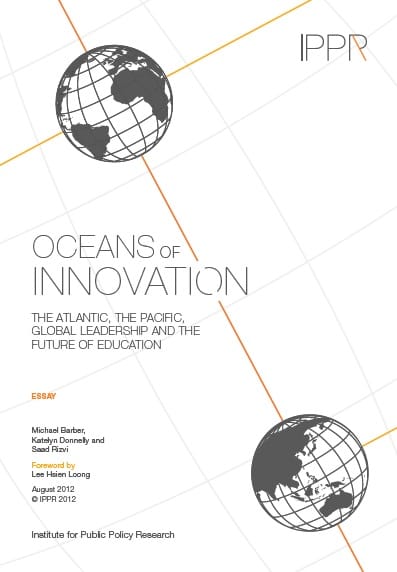 Despite economic and educational premonitions, the twenty-first century does not inevitably belong to the Asian or Pacific nations. In this lengthy essay, Sir Michael Barber and colleagues explain how these nations must revamp their education systems to ensure continued growth and competitive edge. (Presumably the essay’s lessons would benefit the U.S. and other Atlantic nations as well, but those are not the targeted audiences for this piece.) Barber and his colleagues find innovation to be the doorway to twenty-first century global leadership. Yet, as they state, “this philosophy of everyone as an entrepreneur and innovator is not what underpins education anywhere in the world right now.” To unlock this potential, Barber calls for systemic reforms to current Pacific education systems: On the governance front, he pushes for an end to top-down bureaucracies that stymie innovation, the creation of autonomous schools, and private-school growth. He calls for strong academic standards for all (though he wades dangerously into the sullied waters of “twenty-first century skills” acquisition when doing so). He urges schools not to neglect the educations of their best and brightest. And he warns that, without prudent and thoughtful implementation, these would-be dramatic shifts will fizzle. Barber also laces the text with concrete examples of successful systemic shifts. But one has to wonder, why target this advice to the Pacific nations? Many in the U.S. are receptive, indeed eager, to heed it too.
Despite economic and educational premonitions, the twenty-first century does not inevitably belong to the Asian or Pacific nations. In this lengthy essay, Sir Michael Barber and colleagues explain how these nations must revamp their education systems to ensure continued growth and competitive edge. (Presumably the essay’s lessons would benefit the U.S. and other Atlantic nations as well, but those are not the targeted audiences for this piece.) Barber and his colleagues find innovation to be the doorway to twenty-first century global leadership. Yet, as they state, “this philosophy of everyone as an entrepreneur and innovator is not what underpins education anywhere in the world right now.” To unlock this potential, Barber calls for systemic reforms to current Pacific education systems: On the governance front, he pushes for an end to top-down bureaucracies that stymie innovation, the creation of autonomous schools, and private-school growth. He calls for strong academic standards for all (though he wades dangerously into the sullied waters of “twenty-first century skills” acquisition when doing so). He urges schools not to neglect the educations of their best and brightest. And he warns that, without prudent and thoughtful implementation, these would-be dramatic shifts will fizzle. Barber also laces the text with concrete examples of successful systemic shifts. But one has to wonder, why target this advice to the Pacific nations? Many in the U.S. are receptive, indeed eager, to heed it too.
SOURCE: Michael Barber, Katelyn Donnelly, and Saad Rizvi, Oceans of Innovation: The Atlantic, the Pacific, Global Leadership and the Future of Education (London, England: Institute for Public Policy Research, 2012).
